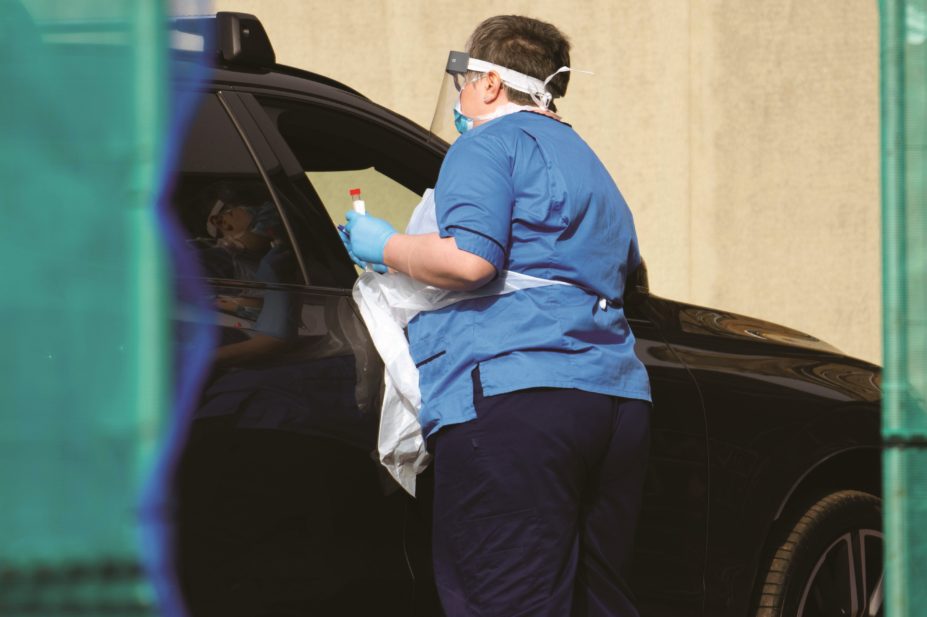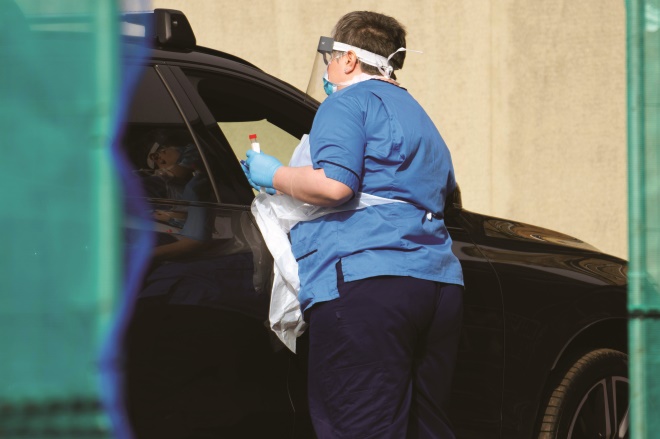
Iain Masterton / Alamy Stock Photo
Open access article
The Royal Pharmaceutical Society has made this feature article free to access in order to help healthcare professionals stay informed about an issue of national importance.
To learn more about coronavirus, please visit: https://www.rpharms.com/resources/pharmacy-guides/wuhan-novel-coronavirus

Source: Iain Masterton / Alamy Stock Photo
A nurse tests drivers for coronavirus at special cordoned off drive-in testing facility at NHS Lothian Western General Hospital in Edinburgh
Community pharmacists will be able to access testing for COVID-19 as part of a government drive to get frontline NHS staff, who are currently self-isolating, back to work.
The testing programme, which was announced by the government on 27 March 2020, was expected to start on the weekend of 28 and 29 March 2020 and will prioritise testing NHS staff in critical care, emergency departments and ambulance services who have been forced to self-isolate at home for 14 days.
The drive comes as the government has opened three new laboratories to manage the demand of increasing the number of tests.
On 30 March 2020, a spokesperson for the Department of Health and Social Care (DHSC) told The Pharmaceutical Journal that under the new programme, key workers would be contacted by their employer before being able to order a test through online retailer Amazon.
When asked when and how community pharmacists would be contacted, the spokesperson said further details would be set out in due course.
The Pharmaceutical Services Negotiating Committee confirmed in a statement on 29 March 2020 that community pharmacists would be included in the new testing programme at some point.
Once a healthcare worker receives a test in the post, the spokesperson for the DHSC added that healthcare workers or members of their family will also be expected to carry out a mouth swab before returning the test to a specialist laboratory using Royal Mail.
However, the DHSC said that if the healthcare worker does not feel comfortable testing themselves, specialist centres are being set up where trained members of staff can do it for them.
On 29 March 2020, Boots UK confirmed that it was supplying staff to undertake testing, although tests would not be carried out in existing stores.
Sebastian James, managing director at Boots UK, said it would “work with the NHS to recruit trained professionals [to carry out the tests] — both Boots colleagues and from the wider community”.
“I am sure there will be many trained healthcare clinicians and students who will step forward to support our dedicated NHS colleagues,” he said.
“‘Drive-through’ test locations are being defined but will be spread across the UK; they will not, however, be in Boots stores, allowing our colleagues to focus on supporting our patients and customers.”
In a joint letter sent to NHS trusts on 29 March 2020, Amanda Pritchard, chief operating officer at NHS England and NHS Improvement; Stephen Powis, national medical director at NHS England and NHS Improvement; and Sarah-Jane Marsh, chief executive of Birmingham Women’s and Children’s NHS Foundation Trust, said community testing centres would be “established in the areas currently facing the greatest challenges” as a “priority”.
The letter advised trusts to “start this week with those working in critical care, emergency departments and ambulance services, and any other high priority groups you determine locally”.
“We will then sequentially expand to other NHS staff groups as more tests are made available to the NHS, and ultimately into other essential public services including social care,” the letter added.
Claire Anderson, chair of the Royal Pharmaceutical Society’s English Pharmacy Board, welcomed the announcement but added that “it is important that all teams across community pharmacy, general practice and hospital settings are protected under this”.
“We now need further information on the timescales for the implementation of this programme,” she added.


